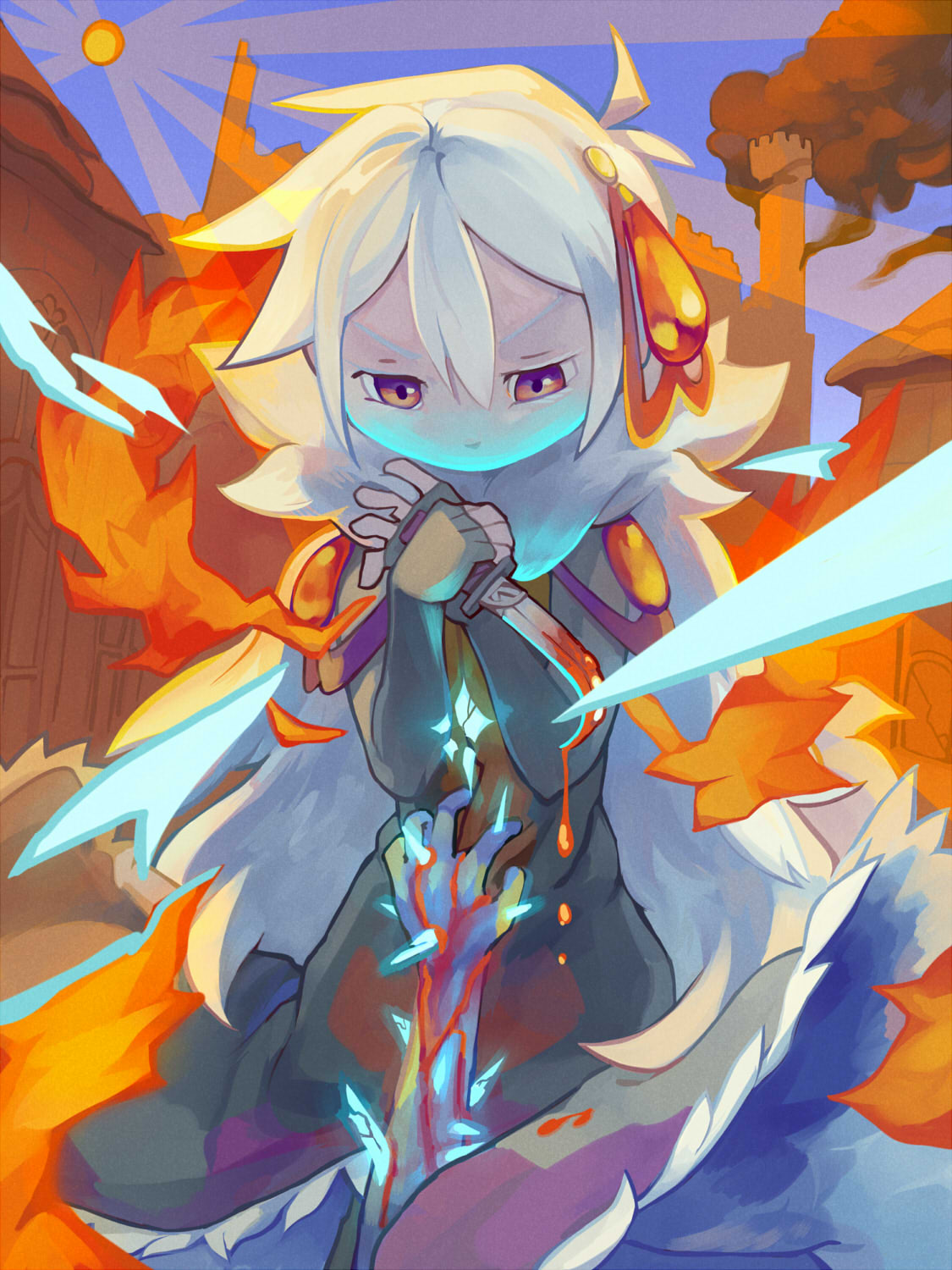phoenix asphodel
overview
Is there anyone whose life your presence has bettered? The hopeful, and ideally natural, answer to this question is 'yes'. For Phoenix Asphodel, second-in-line to the throne of the Kingdoms of Asphodel, it is strictly a 'no'. There is not a single person who is better off now than if he had never been born. So is the apparent consensus of everyone he's ever met, shared also by Phoenix himself.
It's quite a mistake that he's here then. Yet the depth of hatred you receive matters less than your soundness of judgement. Phoenix's judgements, being those of a genius, exceed those of sopping hearts that beg mercy with puppy-eyes for frolicking murderers. If they are not stupid, they are doubtless complicit. A mass of stupidity requires wisdom at its head, where complicit worms will bare themselves in wishes of decapitation.
Rarely do the plebs understand why fixing cracks in the sidewalk, dispelling 'charming' court filth, and casting criminals to the cobbles all matter. Prosperity of hearts cannot be cultivated in a body so fetid with workplace complacency, idolic chichanery, artless hacks, and perverse moral rot. 'Leukocyte' is a vital position. In fact, to purge the wicked and to guard the tender is the purpose of a King's stewardship.
Troubling, then, that Phoenix's own family affiliates thickly with criminal filth — and that Phoenix's earnest but perhaps overzealous solution, driven by paranoia dovetailing into insanity, of, 'kill and resurrect the whole nation as thralls bound under my geas', was not received by the citizenry as 'a good political manouvre'. Actually the Kingdom almost burned down over it. It was a sensible choice given the circumstances.
Swiftly tarred, feathered, and burned on a pyre, the tyrannical reign of Phoenix Asphodel ended. If not for the pernicious meddling of the God who raised him as an Archon, Phoenix would've gone to the oblivion he deserved. Instead he has the pleasure of painfully burning to death every night while isolated from all human contact, and is reaching his quadricentennials.
What blessings.
He'd rather be mortal.
story
From where do Kings gain their authority, that formless and ineffable thing that entitles their scions to rule? Ask this question across the hundred ancient kingdoms of the West, and you will receive a hundred answers in turn. They were the greatest warriors, and so will be their sons. They were the cleverest negotiators, and so will be their sons. They were heroes, they were geniuses. They were chosen sages of incontestable wisdom, they were anointed guardians of holy artifacts. And so the reasons go on, innumerable, though essentially identical: from naturally inheriting the duties and excellence of their mythologised forefathers.
But, it is only for the house of Asphodel, the monarchs to whom every western lord swears fealty, that the answer is truly ‘by the blood’.
Through the veins of house Asphodel runs the same godly ichor that the Demiurge himself once bled, bridging the mortal and the divine by simple pedigree. “God has given sons to save us!” some cried. “Governors from lost Heaven!” went others. Were a claim to godliness their only power, however, time — alongside inevitable ambitions, discontents, and familiarity — would have surely eroded the Asphodels’ rule. No. What kept them King was the miracles.
Their blood is not just a symbol; it is a genuinely miraculous substance with astounding supernatural properties. To the living, it is a quick, lethal venom. To contaminations, dirts, diseases, and poisons, it is a ruthless cleanser. But to the soul, it is succour — for it is only by an ablution in the blood of an Asphodel that a soul might be purified of rot.
That horrible rot! Rot is the curse upon the world that twists all dead souls into unthinking monsters. Nobody except the vassals of Asphodel know any peace from the rot, which turns one poor coffin into a townwide massacre, and forces families to murder corrupted mockeries of their loved kin. The pain of the transformation to the dead, too, is excruciating. But a single drop of Asphodel blood — and the soul calmly rests, in the relaxed sleep of a coma, eternal, unchanged, painless, and pure.
It is to this blood alone that a hundred ancient lords pledged their loyalty. A life in service for a death in peace. For 600 years, the house of Asphodel presided without any particular challenge or incident.
Peace came to thrive. Prosperity soon followed it. These twin hedonisms felt eternal.
They were not. Their unwinding began with Gallus.
The Crown Prince, soon King, Gallus Fidelis Peredur Asphodel.
Gallus was not a dumb man, though he was an irresponsible one. He loved his friends, loved his family, loved to eat and hunt and play and fart and had great rolling laughter that would light every nook of the room. He was ruthlessly friendly, would often mingle with commoners, and seemed to exist for merry adventure. The duties of princehood or kingship never constrained him. With decadence being the fabric of the era, the Kingdom was rich and productive enough to essentially run itself. So Gallus’s days were ones of studying princeship only to the minimum of what his parents demanded, then bolting out the palace like a dog off its leash, getting into misadventures, returning to the palace at evening, and partying well into nightfall. Sunset. Sunrise. Repeat.
It was in this manner that he made many friends, with two of particular note. The first: Toreas of Lacren, a proud and dutiful squire from a distinguished noble household of knights. The second: Faron Whitewood, a homeless guttersnipe urchin who lived by petty theft and pickpocketing. Toreas was more proper, but Faron was more wild and exciting. The intriguing social gap exhilarated Gallus for the sheer difference between his and Faron’s worlds. He and Faron soon became close companions, with Gallus eager to dabble in illicit circles that princes typically never touched, and Faron shockingly sincere in his plain loyalty and liking of Gallus.
Through Faron, Gallus discovered an underbelly in Asphodel rife with concerning practises. Drug rings, kidnappings, rumours of regional lords bending to bribes from thugs or exempting suspicious organisations from taxes. This worried Gallus, who was eager to act, but recognised recklessness could be self-defeating. If he went in, sword raised, to personally execute all these scattered miscreants, it would be a gross overstep of his authority on the regional lords. The most he could do was alert them to impropriety and trust them to manage it themselves. Given that some were complicit, though, this would not work as a flat answer. Further, as Faron advised, the first whiff of trouble would send the ne’er-do-wells scattering to regroup elsewhere. These were quite organised rackets, and tenaciously cowardly ones, too.
Rather than try to destroy them, Gallus contemplated the possibility of controlling them. If he could defang their worst practises, rein in their scope, and hoard up their profits and products for himself, he could minimise their impact substantially. Moreover, if he could use these groups to pressure certain lords in secret, he could bypass a lot of faffing and political meandering to get whatever things he may need done, indeed done. Sort of like mercenaries. Just sneakier. And shadier. And free. Either way the prospect was tantalisingly lucrative.
Eventually, over decades, Gallus and Faron reshaped this national underbelly. Groups were syndicated. Their contracts, regulated. Semblances of legitimacy and honour grew within certain factions, who would autonomously destroy or absorb their freelance competitors. There came codes of thieves, codes of assassins, codes of smugglers. The coordinator of this underworld, mediator of disputes, and broker of contracts was Faron Whitewood — now a very rich man, and welcome in court as minor nobility.
Toreas, witness to this, was appalled. It disgusted him that Gallus would legitimise criminality rather than stop it, and he found it insulting that a common criminal would ever be raised into nobility for, well, being a criminal. Though he tried to discourage Gallus from the scheme, he failed. Fuming, and feeling too betrayed to stay at Gallus’s side, Toreas dismissed Asphodel as corrupt and left the nation, soon becoming a mercenary for the traditionally hostile country of Ordanz, instead.
It was a painful rift for Gallus, but not one he could mend. He pushed Toreas out of his mind, returned to the court’s raucous parties, and raised his shining goblet with a smile.
Gallus soon met and married his lover, an uncontroversially high-bred woman named Rhea. She was quiet and gentle, with a slightly anxious seriousness that counterbalanced Gallus’ more rambunctious demeanour. Still, it was with confidence that she ascended into her new position, and with trust in Gallus’ control that she accepted most of his questionable dealings. Though she could be either when needed, she was more eagerly a wife than a politician, anyway.
Within the two years of Gallus’ parents dying, and of Gallus himself consequently becoming King, he and Rhea produced two children. Their heir and firstborn, Aquila, then a daughter, Columba.
Aquila plainly took after Gallus. He was fiery and prone to adventure, very charismatic and personable. But he was also devious. He enjoyed mocking others and deceiving them, enjoyed misbehaving while knowing himself untouchable. Alongside Faron’s twin sons, Morgan and Mason, he pushed limits — bad limits. But between the smoothness of his tongue and quickness of his wit, people rarely realised just how great a delinquent he was, much less that he’d ever been cruel.
Columba more mirrored Rhea. She was quiet and composed, with great empathy and compassion for life. But she was bitter. She resented Aquila’s manipulations and hooliganism, his filial warmth towards her be damned. Her father’s cavalier attitudes grated at her, and she loathed Morgan and Mason as thugs. The silent expectation that she marry one of them — likely Mason — revolted her. Court was a crucible of vipers. Though only one step removed from the most influential position in the country, she felt herself impotent to change, fix, or escape the dark veil inexorably weaved into the monarchy’s practises.
And that was where Gallus and Rhea stopped. To birth children from the miraculous bloodline of Asphodel imparted an immense strain on mothers outside the pedigree, shearing their souls into pieces. Some queens would be bedridden after siring only one heir. In Rhea’s case, after Aquila and Columba, she could no longer walk and suffered from epilepsy. But her mind was still sound, her physical health was still good, and her energy levels were still high. She could live a long and still quite satisfying life, she and Gallus discerned, provided they had no more children.
Everything would have been fine.
Except that 16 years later, with little joy, Rhea once again became pregnant.
All Phoenix knew about the circumstances of his birth was what the photo albums testified. Pages upon pages of smiles — where his mother playfully fussed with Aquila’s hair, or of Columba guilelessly laughing at some joke of her father’s. His siblings’ growth had been catalogued so extensively, that if each photo were bound into a flipbook, their transformation from toddlerhood to adolescence would be practically seamless.
Then it stopped.
The curtain was one last snapshot of his mother. She was wearing a white sungown as she gazed over the lake from the garden balcony, smiling, but without the joy that teemed from the previous photographs. Despite the bright sun and blue sky, a quiet sense of doom lingered between her crooked lips and wet eyes.
Phoenix imagined her hopelessness only ever got worse, given that was the last photo.
Well, to call it the last one was not quite correct. It was simply the last natural one, where someone had spontaneously decided the moment was precious, and wished to hold and revisit it the way that Phoenix did now. Everything afterwards was purely official. Once a year at the beginning of the first month, one formal photograph of the Royal Family, posed to the aesthetics of the nation’s most esteemed photographers.
One: himself as an infant in the arms of his father, whose strained smile went uncomforted by the conspicuous void beside him. Aquila and Columba were in front, where they couldn’t see.
Two: himself now in Columba’s arms, with her and Aquila’s shoulders cradled by their father. Aquila looked to her with a sly grin that she didn’t return.
Three: himself standing at Aquila’s feet, grasping the tail of Aquila’s coat. Aquila grinned helplessly to their father, who wasn’t smiling. Columba was gone.
She had killed herself that winter. Phoenix found her note hidden in his room come spring.
She wanted him to resurrect her, it said.
This was a more obscure power of the royals. Unlike the unique properties of their purifying blood, the ability to manipulate the bonds that tied dead souls to matter — tying them back into some vessel — was a common trait of occult magicians and witches. The stories of how such practitioners used it, or more often abused it, were horrible. Resurrecting dead children in the bodies of goats and returning them like that to their parents. Souls bound to inanimate objects — plates, chairs, mats, dustbins — that could perceive people using them, and perhaps feel pain if made to, but could not move or scream in any way their inadvertant torturers would hear. Or the more conventional practice of enslavement; binding souls as familiars under torturous geas that would inflict agony should they disobey their witch. It was all called soulsmithing.
The art itself wasn’t inherently evil, but its pitch-black reputation fouled any thought of it. The royals, though they vowed to use it responsibly, were often not above surreptitiously resurrecting their friends or allies. The scandal if anyone knew would be immense. Fortunately, these occurrences were sparse enough, and secretive enough, that no drama had yet come of the practice.
Phoenix, at three years old, was already an unmatched soulsmith. If something was theoretically possible to be achieved with soulsmithing, Phoenix could do it with ease. It was almost a game to him, and he may have treated it as such if it weren’t so inherently serious. Witches who had studied all their lives would pale before his talent. And so did Columba.
She wanted him to resurrect her, the note said. She wanted a new body that would free her from the pressing obligations of her family, and particularly from the obligation of marriage. Her old body had been thoroughly destroyed in the process of her suicide, so that if Aquila or Gallus had any ideas, that vessel wouldn’t be an option.
As it was, though, they had no ideas. Aquila accepted the news soberly even after Phoenix revealed the note, interred her soul in the national crypt with all the other dead Asphodels, and never touched it again. It was around this age that Phoenix was old enough to remember these things with clarity.
So there was little need to reference the albums, past that point. They all melded into the same composition anyway. Aquila in the middle, then Phoenix and their father on opposite sides of him. Inevitably.
Though his father never raised his voice or said anything unkind, Phoenix knew Gallus hated him. Whenever Phoenix entered a room, Gallus would shortly leave. If Gallus and Aquila departed on an outing, Phoenix wouldn’t be invited. Court, where Gallus spent his time socialising and partying, was completely forbidden. Gallus never spoke to Phoenix, or even went near his section of the house. Dinners were so oppressively silent that Phoenix knew by age 5 to just eat in his room. He had that sort of laissez-faire freedom, where he could do anything he wanted — provided his activities never overlapped with Gallus’, and the illusion of Phoenix’s non-existence was maintained.
Really, most people in the house didn’t like Phoenix. Though he was young, he was smart, rude, and mean. He often accused his caretakers of incompetence, and because of his obviously advanced mental development, never bonded properly with peers. He fussed over little things and quibbled about flaws. The fact he withdrew into solitary pursuits — reading and piano — if left to himself only crippled his social skills further, until it became a truism that there was no point approaching Phoenix, unless mandated to by some job, task, or chore.
Aquila was the exception. Though, it wasn’t that Phoenix treated Aquila more amicably so much as Aquila was just ridiculously patient. He would find activities for himself and Phoenix to do together, urge Phoenix to pursue his hobbies, drag him out of his room, listen to him when he wanted to speak, and routinely check in on him. But the obligations of princehood limited Aquila. Whereas Phoenix had almost no expectations placed on him to ascend, Aquila did, and with age he’d come to regard those obligations seriously. Still, even though work made Aquila frequently unavailable, it was Aquila that Phoenix leaned on whenever he wanted help, guidance, or company.
From the outside it just seemed Aquila was indulging a bossy little brat. Aquila’s friends, that being Morgan and Mason, often bullied Phoenix whenever circumstances put them in each others’ presence. With Morgan it was always sly little comments addressed to no one, things that were worded neutrally but spoken like insults. With Mason it was more direct — shoving, harsh noogies, chinese burns. He’d laugh about it as fun boyish roughhousing then just flat call Phoenix a dipshit. Phoenix feared them, particularly Mason, and though tattling to Aquila stopped the worst of it, the anxiety that Mason would one day randomly drop-kick him over a fence never truly abated.
Though uncomfortable, it wasn’t unlivable. Provided he kept to his own business and repelled malicious sorts quickly, he could get by with little drama or trouble.
So that’s what he did, for 11 years.
But trouble, of course, found him anyway.
personality
appearance
A young, albino boy who always looks malcontent. Though he barely reaches to a grown man’s chest, the sheer arrogance of his demeanour suggests he thinks himself fifty feet tall. He less ‘walks’ than ‘marches’, less ‘glances’ than ‘glares’, and less ‘talks’ than ‘barks’. If one were ever to be intimidated by a preteen, this one here would be a good candidate for it.
He keeps overcoat buttoned all the way and unconsciously fiddles with its ruff. Glances around a lot and seems somehow restless. Altogether, he is unapproachable.

personality
A scared child. There a cold-eyed smirk, there a fulsome grin: the world through Phoenix’s eyes is a place of danger, danger, danger, where the only guarantee of safety is to immediately lock everyone out. Those who persist through his snide jibes and cruel judgements find thus: an extremely vulnerable and well-meaning individual with book-smarts, but no grasp of people.
Phoenix is a genius. Blessed with abounding intellect, overflowing creative and academic talent, and a generally quick mind, he is exceptionally good at noticing contradictions and inconsistencies, which he cannot help but scrutinise until he deduces a logical reason for their occurrence. Unfortunately, many things in the world — chiefly people — are not logical, and the conclusions Phoenix draws of them are often unflattering. Why does someone improficient at art call themselves an artist? Because they are a fool or a self-serving deceiver. And so on. Between this elitist attitude and a bevy of unrealistically high expectations for others — since he finds such expectations easy to meet himself — Phoenix constantly misinterprets even good intentions as threats, stupidity, manipulation, or mockery, naturally pushing well-meaning people away.
As such, the only ones left either must hate him or have an agenda. Reflexive insults have become his ward against suspected enemies, but constipate his ability to understand and express his own emotions without becoming disparaging, high-handed, dry, or aggressive. Further, he is highly rigid about rules, closed to new things, and impatient with people who do things they know they should not. His contempt for shoddy work, poor discipline, and a lack of seriousness in one’s occupation is immense, second only to his deep-rooted disdain for corrupt authority figures, meritless social climbers, criminals, foreign actors, and decadence. He’s bossy, intense, and merciless towards anything that rattles society’s ‘order’, reading most pushes against the status quo as purposeful, malicious subversion that ought to be squashed.
After all, Phoenix is a prince of Asphodel — and takes the obligations of this role seriously. Duty binds him to protect the sovereignty, citizenry, and peace of the nation while upholding law, tradition, and social order. Though he lacks political finesse, he is earnest, and more than earnest, his nature beneath the paranoid bluster is outrageously kind. He wants at all times the best outcome for the most people, achieved by yanking others off inadvisable paths, giving them places to fit within society’s framework, and ensuring that framework itself is strong, safe, productive, and healthy. Generosity and leadership come easily to him, as do devotion and protectiveness towards those he thinks vulnerable to exploitation. The sheer breadth of his altruism, when it does happen, is breathtaking.
Get his walls down, stop him from thinking, and it’s clear Phoenix is just a dumb lonely kid. He wants company, comfort, and fun, but is too distrusting and serious to loosen up or let others in. A self-professed realist, rationalist, devilspawn, and guardian of the plebs, he is blind to his own dramatics, quick to defend his doubts and panics as reasonable, and flatly unfamiliar with the concept of people ‘liking him’. The very idea of someone desiring his company for the sake of being in his company makes him extremely suspicious.
Could use a hug.
powers
Archon Immortality: Solar Rebirth
Phoenix burns painfully to death every sunset and is resurrected from his ashes every sunrise. During nighttime he is inert and unconscious. If he is killed, his body burns at sunset as normal and he is resurrected at sunrise as normal.
His resurrection activates once the sun enters a 'risen' position relative to the greatest concentration of his ashes. Celestial bodies will rearrange their orbits to ensure Phoenix is resurrected daily. When he resurrects, he coalesces in a blast of fire.
Archon Power: mortal tyranny
Phoenix is always mind controlling anyone whose presence he registers. This typically means someone he immediately sees, hears, smells, or so on, but also applies to vague sensations of someone ‘being there’. It works on voices or images from live radio or television broadcasts, as well as over the internet, but not on pre-recorded programs or archived online content. He cannot turn it off.
Targets of Phoenix's mind control must obey any order he makes. This includes orders from his conscious thoughts, unconscious thoughts, and subliminal desires. Inevitably, conflicting orders arise from the disconnect between Phoenix’s conscious and unconscious wants, as well as the speed of his thoughts. “Who are you? Step forward, show yourself!” against “Oh god an intruder! Go away! Don’t kill me!”. To perform both actions simultaneously is impossible, but that’s what Phoenix’s mind control demands.
There is no cancellation between orders or check to resolve contradictory orders. Hundreds of contradictory commands batter the subject simultaneously. The body breaks and contorts trying to comply, while the soul soon shatters like a bluescreened computer as it fails to parse the contradictions. This shattering kills the subject swiftly, utterly, and irreparably.
Targets of Phoenix’s mind control know they’re acting against their will, but have no command of their body to stop themselves. Further, anyone who hears him speak or reads text he has written dies instantly from the conceptual potency of his words, trying to interpret individual letters and phonemes as orders.
Archon Power: Pyromancy
Phoenix is your typical pyromancer, able to conjure and manipulate fire. Fires conjured by Phoenix can be up to as vast and hot as those on the sun. That said, though, he mostly uses it for mundane purposes like lighting hearths or incinerating garbage.
Asphodel Bloodline
Characteristic to the Asphodel royal family, Phoenix’s veins run with purifying ichor. A single drop of his blood can completely absolve a soul of rot, and induces peaceful comas in the dead. It doubles as a supernaturally potent venom when ingested by the living. Spiritual drano, essentially.
All souls from this bloodline are immune to rot, and automatically enter coma states when dead. Their bodies are immune to decomposition, nullify poisons and diseases, and reject foreign contaminants. This includes drugs, alcohol, medicines, dyes, inks, dirt, dust, and cosmetics, which are either nullified, or roll off their bodies like water off a raincoat.
Though completely mortal and human-bodied, their conceptual fingerprint is closer to a purity elemental than a human, as they are fundamentally magical entities inseparable from these inherent powers. Their magical constitution bleaches their skin and hair to white, and their eyes to red, regardless of genetics. (Phoenix, genetically, has light tan skin, dark brown hair, and ruddy purple eyes).
Soulsmithing
As a magical strain of Yazata, Phoenix is able to soulsmith.
Soulsmithing is the ability to bind loose, dead souls to matter. It is necromancy, allowing Phoenix to resurrect the dead in various receptacles. He can afflict those he resurrects with binding geas, psychological warps, and general tampering between their body/soul connection. Notably, he can key souls to filter out the junk commands from his mind control, so that it doesn’t instakill them, but not if they’ve already died to it.
Phoenix is a masterful soulsmith, the best in the world, and can proficiently incur most any alteration he wants to a soul without effort.
relations
aquila
brother
The duplicitous brother of Phoenix Valens. Even vipers of the court knew Aquila as noble and kind — they were deceived by the greatest snake among them. This man abetted monarchical villainy and adored criminal rogues as his confidantes. He did so gladly, for the safe health of his nation less worried him than the safe health of his toadies.
Regardless, it is Aquila who comforted Phoenix through his troubles, who introduced him to the pianoforte, who played with him, who spoke with him, who defended him, who spoilt him, and who kept him from being alone. Though fear of malicious eavesdroppers prevents Phoenix from saying so, he both loves and depends on Aquila.
400 years of separation have not changed that sentiment. Phoenix misses him, but resigns themselves both as spectres lingering far beyond their era.
raum
servant
The best friend and caretaker of Phoenix. By his guileless candour and tender heart, Raum has escaped the wolves that raised him. The accoutrement of lingering vices he bears are repulsive, but principally benign, as they are counterbalanced by shame and humility. Raum calls himself a coward; Phoenix sees he is just not a leader. In his role as servant, he performs fairly and well, with his former flightiness attributable to a lack of choice in good masters.
Phoenix is happy to be that good master, and proud to be a demanding one. Left without such an anchor, Raum soon drifts into the company of abusive miscreants, and dashes to pursue hollow fantasies. In exchange, Raum gives Phoenix the friendship, playtime, and care he needs to stay marginally sane, with regular doses of levity to ease the misery that is Phoenix’s life otherwise.
400 years of shared living have only strengthened their bond. Phoenix trusts Raum, and feels driven to protect him from the bad actors his kindness naturally attracts.
reyl
acquaintance
The brutish twin sister of Raum. She is one of the thicker clots of sludge in the gutter: a thief, a murderer, a pimp, a peddler, and an envoy of the evils wrought when loyalty is pledged to coin and the greed that procures it. To be succinct, she is Ordish. Although unfortunate, that basis uproots whatever positives there are to say of her, of which there are perhaps two, or three.
Raum, meanwhile, ought whore himself as the noble’s biographer, for the anthologies he pens on the heroism of this thug. Out of respect for Raum, Phoenix refrains from much discussing Reyl.
trivia
public perception
Was universally disliked for his nasty personality. Pushed away potential friends and withdrew. Never left the palace, so people forgot he even existed.
Nowadays regarded as the most unambiguously evil of the Archons; an unrepentant historical tyrant. Keyword historical. He's been isolated so long that his legacy has faded, and people are forgetting him again.
Aquila tries to keep him relevant by harping on about his reign all the time, making it a mandatory school subject and recognising an annual remembrance day. Phoenix says this is dumb, but he finds it quite touching.
in fights
Walking death machine. His mind control instantly kills everyone he meets. Not really a fight.
Otherwise his combat capabilities are those of a normal twelve-year-old: poor.
romance
He’s 12. If he were older, though, he’d be the type to devote himself entirely to one person and never get over it if the relationship failed.
hobbies
Reading and piano. Writes his own etudes and compositions for fun, usually too complex for others to play. Phoenix is a musical god, in both technical and emotive aspects, whose playing habitually intoxicates listeners into a state of euphoric rapture. He’s, without exaggeration, the world’s best pianist and musician overall.
Book-wise he favours historical nonfiction, scientific journals, and textbooks. Honest-to-god sits down with a fat dry stuffy textbook and reads it in an afternoon. Diligently follows the newspapers too. Expects everyday people to be capable of similar feats.
misc. trivia
- Full name is Phoenix Fidelis Valens Asphodel.
- Self-taught in almost everything he knows. Kept firing his old tutors over random mistakes he saw as incompetence. Longest one lasted four months.
- Skilled mortician and registered funeral officiant. Handling the dead is one of the royal family’s responsibilities, and Phoenix is serious about doing so. Has a massive disdain for graverobbers, the undead, necromancers, and so on.
- Extremely distrustful of magic and anything supernatural. Does not think such things have a good essence, ever. If something magical seems good, its use is probably corrupting.
- Bothered to become fluent in all Asphodelean languages, but refuses to learn any foreign languages on the basis of them being ‘too foreign,’ missing the point of languages completely.
- Overshadowed by his preference for piano, Phoenix is also a godlike singer whose voice could give even a boulder the tingles.
- Loves rain and overcast weather; finds it comfy and calming. Dislikes hot, bright, sunny weather, as he’s prone to sunburns, overheating, and can get migraines from bright lights. Has to wear shades through most of summer.
- Has abysmal luck for absolutely no good reason at all. His life is fraught with dumb injuries and stupid accidents.
- Favourite colours are red and black. Favourite food is roast turkey, favourite drink is hot chocolate.
meta/crack
gallery
art







writing
Sonata, Fidelis
Jun 2018 | G | 1,380 words.
Characters: Phoenix, Aquila
A snapshot of a typical night for the Asphodel siblings. Set sometime before Phoenix's narrative, he's about 10-11 here.
phoenix asphodel
救済の技法